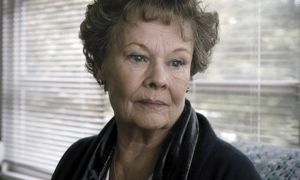The 2013 Golden Teddy Awards for Most Excellence in Music
I’ve brought back my annual awards show. First up, music!
I’ve brought back my annual awards show. First up, music!
This post is also known as “The 2013 Golden Teddy Awards for Most Excellence in Film, Part 1.”
I don’t think the 2013 was much of a year for movies, since I spent a long, long time to find ten that I could unreservedly say I loved. And in the end I chose seven because the other three slots kept getting filled with movies that I had problems with even if I liked them. Most of those movies I liked because of one or two performances, or a performance and a script, or just the direction, and so on, but there were other things that bugged me a little too much. These seven are films for which everything comes together for me and I’ve found myself saying, “Oh, you have to see that.” Continue…
 In the early 1960s, many of the now-iconic folk singers earned their followings and made reputations in the smoky, cramped clubs in New York’s Greenwich Village. This is where you could hear Bob Dylan, Joan Baez, or Joni Mitchell, and be close enough to see the spittle on their lips. As history usually works, we only know the stories of the victors, and in this case, the Dylans and the Mitchells are who we imagine on those tiny stages as we sing along with their records. The failures, however, failed to become history and their voices, songs, and struggles have been swept into the sewers of memory. Some of them were just as deserving but for some reason didn’t connect with a massive audience or a smart record label. Or they just didn’t have the right personalities; narcissists, jerks, depressives drunks, all of the above. The Coen Brothers, among America’s great artists who have managed to embed themselves in history, have imagined one of those Greenwich Village figures who didn’t.
In the early 1960s, many of the now-iconic folk singers earned their followings and made reputations in the smoky, cramped clubs in New York’s Greenwich Village. This is where you could hear Bob Dylan, Joan Baez, or Joni Mitchell, and be close enough to see the spittle on their lips. As history usually works, we only know the stories of the victors, and in this case, the Dylans and the Mitchells are who we imagine on those tiny stages as we sing along with their records. The failures, however, failed to become history and their voices, songs, and struggles have been swept into the sewers of memory. Some of them were just as deserving but for some reason didn’t connect with a massive audience or a smart record label. Or they just didn’t have the right personalities; narcissists, jerks, depressives drunks, all of the above. The Coen Brothers, among America’s great artists who have managed to embed themselves in history, have imagined one of those Greenwich Village figures who didn’t.
In the winter of 1961, Llewyn Davis (Oscar Isaac) is sleeping on the couches of the friends who aren’t angry with him, reeling from the suicide of his former singing partner and a furtive affair with his married friend Jean (Carey Mulligan). His solo album, titled Inside Llewyn Davis, is not selling at all, and his gigs aren’t paying. And then Jean tells Oscar that she’s pregnant and doesn’t know if it’s his or her husband Jim’s (Justin Timberlake), so she has to get an abortion. Oscar sets off the find the money for the procedure while also trying to get his career going, and this leads him to session work, wandering through the cold streets of Manhattan, and in a car on the way to snowy Chicago with hobbled, caustic jazz musician Roland Tuner (John Goodman) and his greaser valet Johnny Five (Garrett Hedlund). Throughout, Oscar carries, loses, and chases an orange tabby cat.
While this does sound like a lot of plot, the Coens don’t much believe in the traditional, tried-and-true structure of stories. Stuff happens, scenes move with drama and humor, but people don’t change in the movies they write.(Their adaptations, like No Country for Old Men and True Grit are different. About Inside Llewyn Davis’s lack of plot, Joel Coen said, “That concerned us at one point; that’s why we threw the cat in.” The cat doesn’t help, because it seems so symbolic that I kept trying to figure what it was symbolic of – and I never did.
 But we are privy both to lines and images that get stuck in your head, and Inside Llewyn Davis has many: Oscar Isaacs holding the cat on the subway as it stares at the stations going by to Isaacs shuffling through the snow outside a Chicago bus station, from one of his hosts screaming at him about testicles to Cary Mulligan’s swearing tirades, from Adam Driver’s hilarious baritone noises on a song called “Please Mr. Kennedy” to John Goodman’s monologues, which are among the best the Coens have ever written. And the songs, produced by T. Bone Burnett and Marcus Momford, are wonderful, gorgeous and moving when they’re supposed to be, dated and silly when they’re supposed to be.
But we are privy both to lines and images that get stuck in your head, and Inside Llewyn Davis has many: Oscar Isaacs holding the cat on the subway as it stares at the stations going by to Isaacs shuffling through the snow outside a Chicago bus station, from one of his hosts screaming at him about testicles to Cary Mulligan’s swearing tirades, from Adam Driver’s hilarious baritone noises on a song called “Please Mr. Kennedy” to John Goodman’s monologues, which are among the best the Coens have ever written. And the songs, produced by T. Bone Burnett and Marcus Momford, are wonderful, gorgeous and moving when they’re supposed to be, dated and silly when they’re supposed to be.
As is usual with the Coens, each performance is strong and idiosyncratic. After a decade of working mostly under the radar, Oscar Isaacs will now be recognized as a leading man; his Llewyn is funny, crass, desperate, and musically moving, if not terribly likeable. Mulligan’s role is small but loud and snide, and she’s great fun. Timberlake has little to do, but his naïve sweetness is a great counterpoint to Isaacs. Goodman’s barely alive Falstaffian monster is the best part of the movie, and I hope he is not forgotten at Oscar time. The film itself will be nominated for many, but as good as it is, Inside Llewyn Davis may end up lost in the stack of their better films. Not forgotten, but not iconic either.
Inside Llewyn Davis
Written and Directed by Joel & Ethan Coen
Starring Oscar Isaac, Carey Mulligan, and John Goodman
Rated R
Opens in San Diego December 20
 I recently saw a comment about Philomena that described it as the inoffensive movie your mother will love. While I didn’t quite find that to reach the level of offensive, it did stick in my craw. Of course, there are movies cynically made for specific audiences – Tyler Perry makes movies largely for black audiences, and Michael Bay makes his for teen-aged boys – and I’m sure that some marketing professional has figured out that Judi Dench, who plays the titular character, is a favorite of middle aged women. However, the comment made it sound like Philomena was a movie for mothers, in the way that romances are supposedly “chick flicks,” as if men aren’t supposed to enjoy movies featuring large roles for strong female characters. If you can identify with the film’s central characters, you can enjoy the movie, and I think it takes a small mind not to believe that just about anyone can identify with an older woman looking for her long lost son. Especially if that older woman is Judi Dench at her most sympathetic.
I recently saw a comment about Philomena that described it as the inoffensive movie your mother will love. While I didn’t quite find that to reach the level of offensive, it did stick in my craw. Of course, there are movies cynically made for specific audiences – Tyler Perry makes movies largely for black audiences, and Michael Bay makes his for teen-aged boys – and I’m sure that some marketing professional has figured out that Judi Dench, who plays the titular character, is a favorite of middle aged women. However, the comment made it sound like Philomena was a movie for mothers, in the way that romances are supposedly “chick flicks,” as if men aren’t supposed to enjoy movies featuring large roles for strong female characters. If you can identify with the film’s central characters, you can enjoy the movie, and I think it takes a small mind not to believe that just about anyone can identify with an older woman looking for her long lost son. Especially if that older woman is Judi Dench at her most sympathetic.
The film is based on Martin Sixsmith’s book The Lost Child of Philomena Lee, which tells the story of a retired Irish nurse who reveals to her daughter, fifty years after the fact, that as an unmarried young woman (Sophie Kennedy Clark), she gave had given birth to a son in a convent. As repayment to the nuns, she was forced to work as their indentured servant and was forced to give her son up for adoption. In the film version, Martin, who is played by Steve Coogan, who also co-wrote the screenplay, decides to tell Philomena’s story after being fired as a spin doctor for Tony Blair’s government and figures that a human interest story could be his entry back into journalism. Martin is an upper class snob who attended Oxford and his initial feelings about the common, naïve, romance novel-reading bitty are both comic and slightly appalling, particularly when recounted to his cynical editor (Michelle Fairley).
But as Martin spends more time with Philomena, learning more about her story, about the revolting behavior of the nuns, and about what may have happened to her son over the years, he becomes more empathic. This is jumpstarted by Philomena’s stern reprimands to his more snide remarks. Philomena is not just an old pensioner with a sad story, it turns out. While untraveled and unsophisticated, her kindness and curiosity are expansive, and her power for love is only surpassed by her power for forgiveness. Dench is as easy a comedian as she is a tragic heroine, and her versatility and believability are why she is one of the world’s great actresses. This struck me particularly during the close-ups of the wistful gazes that represented her remembering the trauma of the convent. Unlike Bruce Dern’s blank stares in Nebraska that meant nothing, Dench communicates entire narratives with her eyelids. It’s a remarkable performance.
However, the movie is not simply a vehicle for Judi Dench’s awesomeness. Coogan, who is one of Britain’s great comic actors but is less known here, makes Martin Sixsmith both obnoxious and likable, with his snarky eye-rolling at Philomena’s old lady-ness tempered by his dogged support and defense of her as her story becomes more complicated. His screenplay and Stephen Frears’s direction are trickless and straightforward, and this makes some of the more astonishing twists in the narrative worthy of gasps. (And Coogan handles the revelations about Philomena’s son better than Sixsmith originally did.) The film is by no means perfect; the flashbacks are too dreamy and some secondary characters are under-written. This is, at its heart, a sentimental journey, but Coogan, Frears, and composer Alexandre Desplat made sure that it was not a maudlin one.
Philomena
Directed by Stephen Frears
Written by Steve Coogan and Jeff Pope
Starring Judi Dench, Steve Coogan, and Sophie Kennedy Clark
Inexplicably rated R
At your local multiplex
I’ve started to think that when judging movies we should not compare them all on an equal plane. They should be placed into specific categories, and these shouldn’t be based on genre, like comedy or drama, but rather on budget. A movie with a $5 million budget, for instance, doesn’t deserve to be placed next to a movie with a $150 million budget. They are usually being made for very different reasons, for very different audiences. The makers of Fruitvale Station, for example, hope their movie will be seen by as many people as possible, but even if they pandered to sentimentality, they were not pandering towards mass audiences’ desire for blood, flash, and obvious emotional resolutions. Massively expensive movies like Thor: The Dark World pander to those things while being vehicles for selling toys, selling TV shows, selling the next Marvel movie. They are meant to be easy to dub in other languages, because the international market for special effects laden films is now bigger than the US market is. As one of those films, The Hunger Games: Catching Fire is the best of the year.
When last we saw our heroes at the end of last year’s The Hunger Ganes, Katniss Everdeen (Jennifer Lawrence) and Peeta Mellark (Josh Hutcherson) had won the 74th annual Hunger Games, a battle royale pitting tributes from the 12 districts that comprise the dystopian future nation Panem. Two champions are randomly selected from each district, and they are thrown into an arena and told to kill each other while a nation watches; the last survivor wins. But Katniss refused to kill Peeta, who was also from her home, District 12. Because she had become so popular, and the masses had come to believe Katniss and Peeta were in love, the government of Panem allowed them to live.
But in defying the government, and its dastardly President Snow (Donald Sutherland), Katniss and Peeta became symbols of hope for the people oppressed and enslaved by Snow’s government and the people in the capital, who live like Roman dilettantes. Snow decides Katniss needs to be eliminated, and with the help of the new producer of the games, Plutarch Heavensbee (Philip Seymour Hoffman), the 75th Hunger Games is used to pit former winners of the games against each other, to get rid of Katniss as well any other potential symbol of resistance. Like much of the behavior of Snow and the Panem government, it’s horrifying and cruel, and the former winners, while resolved to their fates, are furious. Peeta and Katniss end up allied with the dashing Finnick Odair (Sam Claflin), the elderly Mags (Lynn Cohen), the bitter Johanna Mason (a revelatory Jena Malone), the brilliant Beetee (the great Jeffrey Wright), and the probably crazy Wiress (Amanda Plummer, doing what she does best). What happens during these games is thrilling, disturbing, and, unless you’ve read the book by Suzanne Collins, surprising. The parallels to The Empire Strikes Back, in both quality and themes, are clear by the end of Catching Fire.
Like its predecessor, the success of Catching Fire lies in both the rich and layered source material and the inspired casting. Lawrence, who won an Oscar in March for Silver Linings Playbook, is the rare actor who is completely convincing as an action star and a dramatic lead, and even rarer, she can do both at the same time. Katniss is both the emotional and moral center of the story, and Lawrence expresses Katniss’s complexities – a fierce hunter, a confused lover, an enraged subject — with a raw fury. It’s unexpected for a blockbuster to be so resonant, but they all can’t have Jennifer Lawrence.
The Hunger Games: Catching Fire
Directed by Francis Lawrence
Written by Simon Beaufoy and Michael Arndt
Starring Jennifer Lawrence, Josh Hutcherson, and Woody Harrelson
Rated PG-13
At your local multiplex